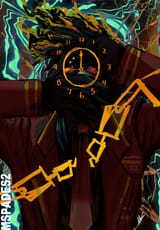I had a theory that the point of the Sinners is that each of their source books end in misery, and that the purpose of Inferno is for Dante to avert their fates in order to reenact a Realization and prime the boughs like in previous games.
It mostly holds up but there are a few Sinners that really don't seem to fit.
>Yi Sang dies of tuberculosis and crow's eye view is basically pure suffering
>In Marlowe's play Faust is damned by his desire for satisfaction (the more well known book by Göthe sees him redeemed through God's infinite mercy, however)
>Don Quixote's dream dies as chivalry fades into the past
>Yoshihide kills himself after completing the painting of hell
>Mersault is executed because he does not take charge of his own destiny
>Hong Lu leaves the world behind forever
>Heathcliff loses Catherine and dies from grief
>Ahab and the Whale both die at sea (but Ishmael lives and proceeds to recount the tale)
>Rodion is sentenced to gulag (but does achieve a kind of realization)
>Demian dies (but ultimately as part of Sinclair's realization)
>Odysseus returns and assumes the throne (But the Divine Comedy is very relevant here as he is the only Limbus Sinner that explicitly features in hell)
>Gregor rots away in his room until death
As you can see there are a few major problems with my hypothesis, namely that Ishmael, Rodion, Sinclair and arguably Faust and Odysseus can't really be said to have bad endings. Odysseus goes to hell later, so we can scratch him, and we can assume that Faust is based off of the original story and not Göthe's rendition.
That still leaves three sinners whose stories don't exactly end happily but whose characters either go through something similar to a Realization or at least don't lose everything.
Help me make sense of these themes /lcg/
